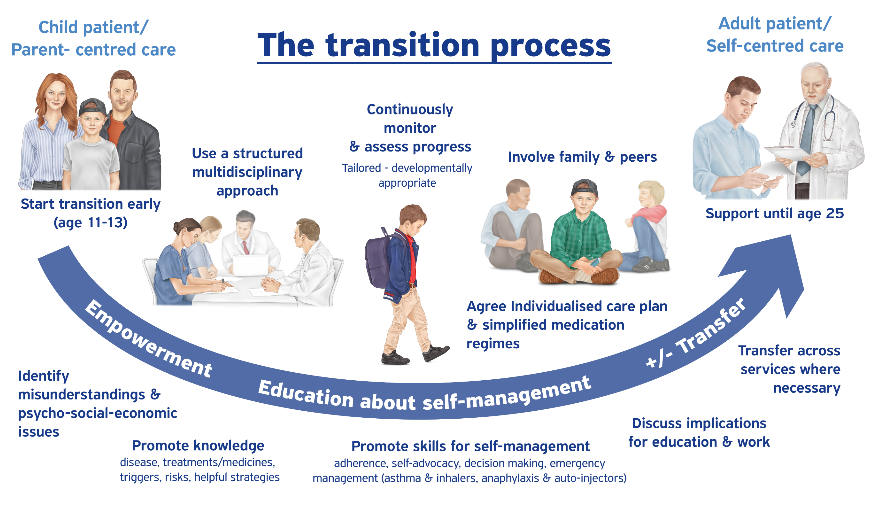Improving allergy, skin disease and asthma care for young people
Adolescence and young adulthood (11 to 25 years of age) can be a difficult time, even more so when affected by allergy, skin disease and asthma. Young people undergo the challenging transition from being children, whose medical care is supervised by their parents, to independent adults. Young people gradually develop the necessary knowledge and skills to take full responsibility for their disease. This includes managing symptoms and treatment, communicating with health care professionals on their own, organising their own prescriptions and scheduling medical appointments.
Doctors and nurses need to consider any ongoing psychological and social challenges or major lifestyle changes that young patients may be experiencing. This is particularly so when patients move to college, university, or into the working world. During adolescence and young adulthood, patients typically pay more attention to peers and those slightly older than them than to their parents or healthcare professionals. Consequently, they are more likely to make decisions which may have negative effects on their health and well-being.
The European Academy of Allergy and Clinical Immunology (EAACI) is a medical organisation for doctors and nurses dedicated to improving the lives of people affected by allergic diseases. Recently, EAACI has developed written advice for healthcare providers to help them support and assist these patients. This was developed by doctors, nurses, researchers, psychologists and patient representatives from 10 European countries. Recommendations are based on a comprehensive literature review on studies about how young people transition into adult care. The guideline goes over some of the challenges experienced as well as approaches that helped maintain good control of allergy, skin disease and asthma in this age group (https://onlinelibrary.wiley.com/doi/10.1111/all.14258, https://onlinelibrary.wiley.com/doi/10.1111/all.14269).
EAACI’s recommendations cover general issues including: (i) teaching young people how to self-manage their own asthma, allergies and skin disease early (e.g. from 11-13 years), (ii) ensuring that clinics have specific plans about how to care for young people as they grow up, (iii) checking that young people fully understand their condition and can access trusted resources, (iv) active monitoring of what medication the young person is actually taking and (v) discussing implications of their conditions for further education and work.
Specific allergy, skin disease and asthma recommendations include (i) making the young person’s treatment easy to follow and using electronic reminders; (ii) focusing on allergy management areas where the young person is less confident and engaging their friends in the training of these patients; (iii) identifying young patients with depression, anxiety or under emotional stress (e.g. parental divorce, bullying) which may affect their asthma, skin disease and allergies; (iv) encouraging families to support young people as they move towards self-management and (v) inciting young people to let their friends know about their allergies, asthma and skin diseases.
The usefulness of the advice developed for doctors and nurses was assessed by patients and parents, who evaluated the importance of each recommendation. A total of 1,210 responses from 24 European countries were received and collated. These recommendations were not only useful for doctors and nurses but also important and relevant to patients and their parents.
With this guideline, EAACI expects to improve support of young people to become responsible adult patients, thus reducing the severe and even fatal risks recognised at this age, and providing them with lifelong skills for allergic disease management.
Read the guideline here: https://onlinelibrary.wiley.com/doi/abs/10.1111/all.14459

